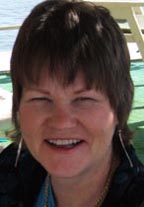
| Joan Sharp, Teaching Professor |
|
B.A. McGill, B.Sc. (Honors) McGill |
|
M.Sc University of British Columbia |
|
|
Office: |
778-782-5936 |
Room: B9243 |
|
Teaching Lab: B8210 |
|
jsharp@sfu.ca |
Contact Us |
|
As an Instructor, Senior Instructor, and Teaching Professor I have been teaching at Simon Fraser University since 1982, primarily in General Biology courses. I try to ensure that my teaching and course development activities follow my teaching philosophy.
Encouraging students to question...
I first studied biology at McGill University in 1968. Ten years later, I looked at my old textbook and was amazed to see how much of the information I had learned was incorrect or incomplete. The living world cannot be divided into plants and animals. Cell membranes are not sandwiches of protein and lipid. The central dogma of molecular biology, that information flows unidirectionally from DNA to RNA to protein, is sometimes violated.
If we teach biology as a body of facts, we are doing our students a grave disservice. The majority of the facts we are teaching them today are still incorrect or incomplete. Although the living world is fascinating, a course full of facts about living processes can be very boring. The primary objective of a biology course should be to encourage students to develop critical thinking skills and to increase their understanding of and appreciation for the natural world. It is essential to reward students for their understanding of concepts, not merely for their ability to regurgitate facts. Facts are important, but only in the context of the concepts that give them meaning. A challenging classroom is investigative and requires students to actively develop their own ideas and understanding, not merely to passively take notes.
To achieve these objectives, I require students to develop and nurture a curiosity about living things. Students are encouraged to question what they see and hear. They are expected to ask questions when the concepts or examples are not clear. They should ask questions about aspects of the material that arouse their curiosity, or when they wish to know more about current biological knowledge of a particular topic. It is especially important to tell students that biologists do not have all the answers to biological questions. Each course should introduce students to questions that are the focus of current biological research, questions whose answers are incomplete or controversial.
As an instructor, I provide opportunities for students to actively explore and develop their own understanding of biological concepts through writing. By writing about biology, students find out what they know and do not know. I can gain insight into students’ understanding of biology by reading what students have written. I can use students’ written work as a starting point to address areas of misunderstanding and to help students refine their ideas and expression. I find that ‘writing to learn’ is a powerful tool to engage students and help them master course content.
Teaching is a wonderful way of continuing my own education. I find that I learn from my colleagues, from teaching assistants, and, most of all, from the students I teach.
|